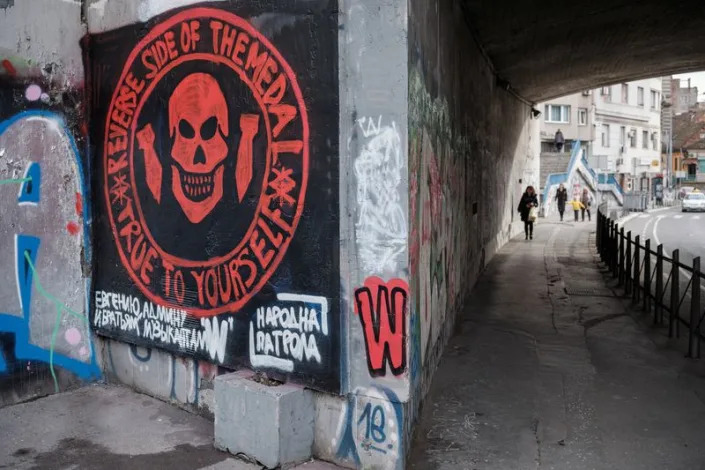
A mural depicting Wagner private military group in seen on a wall in Belgrade
Thu, January 19, 2023
BELGRADE (Reuters) - Serbian and pro-Ukraine activists filed criminal complaints against Russia's Wagner paramilitary group and its supporters on Thursday, accusing it of recruiting Serbs to fight in Ukraine.
Cedomir Stojkovic, a Belgrade-based lawyer who also leads the October civic group, said that those accused include Russia's ambassador to Serbia, Alexander Botsan-Kharchenko, and Aleksandar Vulin, head of Serbia's state Security and Information Agency (BIA).
“We have reasonable suspicion that Vulin ... gave orders, directives and guidelines that the activities of the Wagner Group in Serbia should not be prevented,” he said.
Stojkovic said that Botsan-Kharchenko, who enjoys diplomatic immunity, could not be prosecuted in Serbia, but that he should be ordered to leave the country.
Once a criminal complaint is filed, it is up to the state prosecutor to decide whether or not to proceed.
Neither Russian embassy to Belgrade, nor the BIA replied to requests for comment.
Petr Nikitin, the head of the Russian Democratic Society, a group that opposes policies of the Kremlin, said those who spread hatred against Ukraine must be prosecuted.
“Spreading hatred among Serbs towards Ukrainians, towards a people who have never done anything bad to Serbia ... is a crime," he told reporters.
According to observers, dozens of Serb volunteers and mercenaries took part in the fighting alongside pro-Russian forces in Ukraine since 2014.
The Serbian legislature prohibits participation of its citizens in conflicts abroad and several people have been sentenced for doing so.
On Monday, Serbian President Aleksandar Vucic criticised Russian websites and social media groups for publishing advertisements in the Serbian language in which the Wagner group, led by Evgeny Prigozhin, an ally of Russian President Vladimir Putin, calls on volunteers to join its ranks.
Vucic also denied allegations that the Wagner group has a presence in Serbia where pro-Kremlin and ultranationalist organisations have long supported the invasion of Ukraine.
Serbia is a candidate to join the European Union, but it also has close ties with Russia, a Slavic and Orthodox Christian ally, and entirely depends on gas imports from Russia.
Earlier this week, Prigozhin denied his organisation has a presence in Serbia.
Although it has repeatedly condemned Russia's Feb. 24 invasion of Ukraine at the United Nations and several other international forums, Belgrade has so far refused to impose sanctions against Moscow.
After big Ukrainian gains in the conflict in the second half of 2022, the frontlines have largely been frozen in place over the past two months, with neither side making big gains despite heavy casualties in intense trench warfare.
Wagner has taken a leading role in fighting near the eastern city of Bakhmut and Prigozhin claimed on Thursday his forces had seized the village of Klishchiivka on Bakhmut's outskirts. Kyiv has previously denied that the settlement has fallen. Reuters could not confirm the situation there.
(Reporting by Aleksandar Vasovic; Editing by Nick Macfie)
Russia’s Wagner mercenary company may earn up to $1 billion by gold mining in Africa, Politico

Russia is mining gold in Africa
Read also: Ukraine's army eliminates Wagner mercenaries’ headquarters and field depot in Soledar – video report
Wagner has considerably expanded its mining business in the Central African Republic to reap up to $ 1 billion in profits. The Western official told Politico that money will highly likely go for buying weapons and paying mercenaries.
The United States has for years warned that Wagner Group has been using mining profits to support the Kremlin regime, evading Western sanctions. New data about Wagner PMC's projects in Central Africa show continuous growth of profit to fund the Russian full-scale war in Ukraine, Politico wrote.
According to the diplomatic cable acquired by the editorial staff, Wagner Group has turned a gold mine located near the town of Bambari into a massive complex that spans eight production zones, with the largest one of over 60 meters (200 feet) deep.
Read also: Wagner PMC sued over recruiting Serbs
The United States says the group is intended for long-term exploration as it fortified the mine, constructed bridges with truck-mounted anti-aircraft guns at key locations.
The CAR bans U.N. peacemakers from launching drones at the mine's location with some of them even shot down by the country's military. U.S. officials consider this evidence of the political power of the Wagner Group in the country.
Read also: Russia’s Wagner mercenary company recruiting political prisoners from Chechnya, says Ukrainian intel
At the beginning of the summer U.S. newspaper the New York Times reported that Wagner PMC owns several gold mines in Sudan to raise money for the Kremlin's regime amid sanctions and pressure from the West. "Wagnerites" also use natural resources from other countries, Politico reported earlier.
Read also: Wagner Group has brought in more than 38,000 prison inmates: Podolyak
U.S. National Security Council spokesperson John Kirby has said that the Wagner Group's owner and Russian oligarch Yevgeniy Prigozhin is spending more than $100 million per month to fund his group’s operations inside Ukraine.
According to the U.S. estimates, about 50,000 Wagner's mercenaries are located in Ukraine. About 10,000 of them are contract soldiers, while others were recruited in prisons.

Russia is mining gold in Africa
Read also: Ukraine's army eliminates Wagner mercenaries’ headquarters and field depot in Soledar – video report
Wagner has considerably expanded its mining business in the Central African Republic to reap up to $ 1 billion in profits. The Western official told Politico that money will highly likely go for buying weapons and paying mercenaries.
The United States has for years warned that Wagner Group has been using mining profits to support the Kremlin regime, evading Western sanctions. New data about Wagner PMC's projects in Central Africa show continuous growth of profit to fund the Russian full-scale war in Ukraine, Politico wrote.
According to the diplomatic cable acquired by the editorial staff, Wagner Group has turned a gold mine located near the town of Bambari into a massive complex that spans eight production zones, with the largest one of over 60 meters (200 feet) deep.
Read also: Wagner PMC sued over recruiting Serbs
The United States says the group is intended for long-term exploration as it fortified the mine, constructed bridges with truck-mounted anti-aircraft guns at key locations.
The CAR bans U.N. peacemakers from launching drones at the mine's location with some of them even shot down by the country's military. U.S. officials consider this evidence of the political power of the Wagner Group in the country.
Read also: Russia’s Wagner mercenary company recruiting political prisoners from Chechnya, says Ukrainian intel
At the beginning of the summer U.S. newspaper the New York Times reported that Wagner PMC owns several gold mines in Sudan to raise money for the Kremlin's regime amid sanctions and pressure from the West. "Wagnerites" also use natural resources from other countries, Politico reported earlier.
Read also: Wagner Group has brought in more than 38,000 prison inmates: Podolyak
U.S. National Security Council spokesperson John Kirby has said that the Wagner Group's owner and Russian oligarch Yevgeniy Prigozhin is spending more than $100 million per month to fund his group’s operations inside Ukraine.
According to the U.S. estimates, about 50,000 Wagner's mercenaries are located in Ukraine. About 10,000 of them are contract soldiers, while others were recruited in prisons.
U.S. cable: Russian paramilitary group set to get cash infusion from expanded African mine
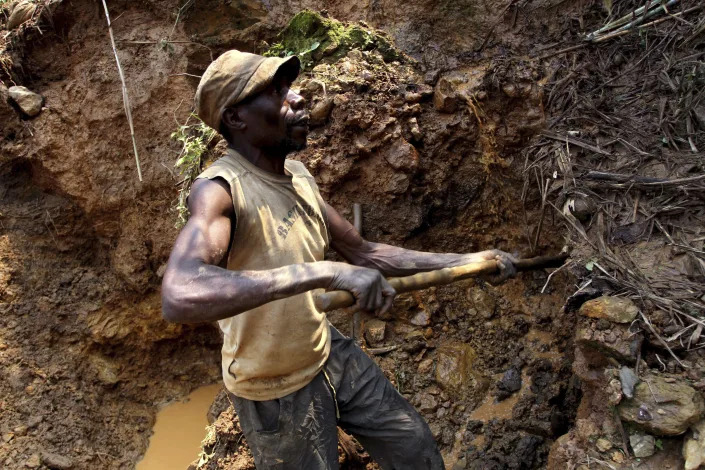
Marc Hofer/AP Photo
Erin Banco
Thu, January 19, 2023
The Wagner Group, a paramilitary organization linked to Russia, is expanding its mining projects in Africa to bring in millions to prop up its military operations in Ukraine, according to a Western official and a U.S. cable obtained by POLITICO.
Over the past year, Wagner has significantly expanded its work in one country — the Central African Republic — where it could see mining profits soar to almost $1 billion, according to the official and the diplomatic cable. That funding will likely be used by the group to acquire new weapons and fighters, the official said.
The group, owned by Russian oligarch Yevgeny Prigozhin, engages in paramilitary activities across the globe, including in Africa and the Middle East, and has become increasingly active on the frontlines in Ukraine. The Kremlin denies any official link to Wagner.
U.S. officials have for years warned that Wagner has been using mining profits to help prop up the Russian state amid Western sanctions. The details about the projects in CAR show that Wagner’smining efforts are becoming increasingly lucrative for the organization andcreating a pipeline of funding for Russia’s war against Ukraine.
Wagner set up shop in CAR in 2018, creating a cultural center and striking several deals to help secure mining sites, including at the Ndassima gold mine located near the town of Bambari in the middle of the country. Since then, Wagner has turned the once-artisanal mine into a massive complex, according to the cable.
Today, the mine spans eight production zones in various stages of development — the largest estimated to be approximately over 200 feet deep, according to the cable. The U.S. has assessed that the group is helping construct the site for long-term exploitation and has fortified the mine, constructing bridges at river crossings and with truck-mounted anti-aircraft guns at key locations.
“These new developments that they're taking indicate long-term plans for the mine,” said Catrina Doxsee, associate director and associate fellow for the Transnational Threats Project at the Center for Strategic and International Studies, a D.C.-based think tank. “The fact that they are establishing an expanded mining operation, that they're establishing these long-term plans, I think really points to how integrated they've become with the local military and the level of dependency that the CAR government has on them.”
The National Security Council declined to comment. The State Department said in an emailed statement that the U.S. is pursuing “multiple avenues to counter the Wagner group’s illicit transnational activities.” That has included sanctions on Prigozhin and Wagner’s network.
In December, the Commerce Department implemented export controls to try and block the group’s ability to acquire new weapons. Officials in the U.S. are in the process preparing additional measures to punish the group, another person familiar with the matter said, who requested to remain anonymous to discuss potential forthcoming government announcements.
The Central African Republic is now refusing to grant overflight clearances of the mine of unmanned aerial vehicles to U.N. peacekeepers in the country, according to the cable. Several of them have taken fire from the CAR army. U.S. officials believe this is a sign that Wagner is gaining political control in the country, the cable said.
Wagner has a history of using force to push through its mining interests in Africa. In 2020, it sent fighters to the Ndassima mine to secure the area. In 2021, the group was accused of summarily executing rebels and other people living in the area to push them out from their homes in order to develop the mine. Since then, Wagner has operated under the cover of a Madagascar-registered company, according to the cable.

Marc Hofer/AP Photo
Erin Banco
Thu, January 19, 2023
The Wagner Group, a paramilitary organization linked to Russia, is expanding its mining projects in Africa to bring in millions to prop up its military operations in Ukraine, according to a Western official and a U.S. cable obtained by POLITICO.
Over the past year, Wagner has significantly expanded its work in one country — the Central African Republic — where it could see mining profits soar to almost $1 billion, according to the official and the diplomatic cable. That funding will likely be used by the group to acquire new weapons and fighters, the official said.
The group, owned by Russian oligarch Yevgeny Prigozhin, engages in paramilitary activities across the globe, including in Africa and the Middle East, and has become increasingly active on the frontlines in Ukraine. The Kremlin denies any official link to Wagner.
U.S. officials have for years warned that Wagner has been using mining profits to help prop up the Russian state amid Western sanctions. The details about the projects in CAR show that Wagner’smining efforts are becoming increasingly lucrative for the organization andcreating a pipeline of funding for Russia’s war against Ukraine.
Wagner set up shop in CAR in 2018, creating a cultural center and striking several deals to help secure mining sites, including at the Ndassima gold mine located near the town of Bambari in the middle of the country. Since then, Wagner has turned the once-artisanal mine into a massive complex, according to the cable.
Today, the mine spans eight production zones in various stages of development — the largest estimated to be approximately over 200 feet deep, according to the cable. The U.S. has assessed that the group is helping construct the site for long-term exploitation and has fortified the mine, constructing bridges at river crossings and with truck-mounted anti-aircraft guns at key locations.
“These new developments that they're taking indicate long-term plans for the mine,” said Catrina Doxsee, associate director and associate fellow for the Transnational Threats Project at the Center for Strategic and International Studies, a D.C.-based think tank. “The fact that they are establishing an expanded mining operation, that they're establishing these long-term plans, I think really points to how integrated they've become with the local military and the level of dependency that the CAR government has on them.”
The National Security Council declined to comment. The State Department said in an emailed statement that the U.S. is pursuing “multiple avenues to counter the Wagner group’s illicit transnational activities.” That has included sanctions on Prigozhin and Wagner’s network.
In December, the Commerce Department implemented export controls to try and block the group’s ability to acquire new weapons. Officials in the U.S. are in the process preparing additional measures to punish the group, another person familiar with the matter said, who requested to remain anonymous to discuss potential forthcoming government announcements.
The Central African Republic is now refusing to grant overflight clearances of the mine of unmanned aerial vehicles to U.N. peacekeepers in the country, according to the cable. Several of them have taken fire from the CAR army. U.S. officials believe this is a sign that Wagner is gaining political control in the country, the cable said.
Wagner has a history of using force to push through its mining interests in Africa. In 2020, it sent fighters to the Ndassima mine to secure the area. In 2021, the group was accused of summarily executing rebels and other people living in the area to push them out from their homes in order to develop the mine. Since then, Wagner has operated under the cover of a Madagascar-registered company, according to the cable.
THERE IS A WORD FOR THAT; GHOULS
Russia’s Wagner Group Accused of Ripping Off Grieving FamiliesAllison Quinn
Thu, January 19, 2023
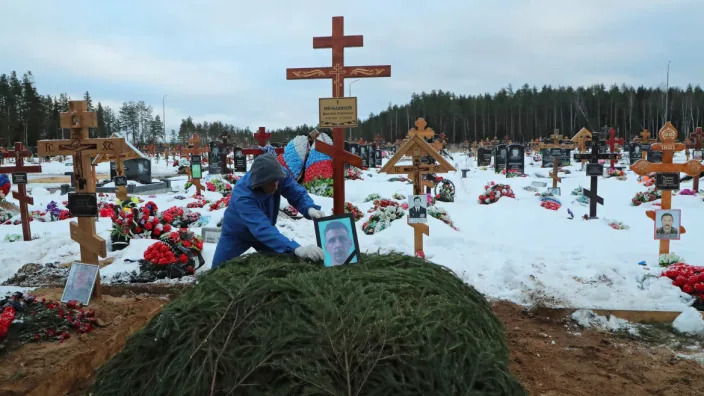
Igor Russak/Reuters
While Russia’s Wagner Group embarks on a frenzied recruiting spree after massive losses in Ukraine, pissed-off family members of dead recruits say they’ve been ripped off by the shady band of mercenaries.
“I buried my son, and haven’t gotten any kind of payment for him yet, not a cent! I will not be quiet about this!” said Yelena, the mother of Sergei Shevchenko, a prison inmate in the Krasnoyarsk region who died after being recruited by Wagner.
Local authorities in the town of Kodinsk announced Shevchenko’s death and wrote that the family was in need of “financial support” to give the former inmate a proper burial, according to local media. This despite Wagner promising to cover burial expenses and issue compensation for war deaths.
Yelena said she didn’t know that her son, who’d been jailed on a repeat drunk driving offense, had been swept up by Wagner until he’d already been taken away to join the war.
“I’ve already raised a fuss with the military registration and enlistment office, and reported it to our local newspaper … . If this ‘Wagner’ doesn’t give me anything, I will seek him out!” she said.
Other families have made similar complaints. After Nikita and Alexander Arychenkov, two brothers from the Krasnodar region, were killed while fighting for Wagner in late December, their sister took to social media to shoot down claims the family could at least take consolation in the fact they now have “material prosperity.”
“Nobody has paid [us] anything,” she said.
Russia’s Shadow Army Exposed and Humiliated by Bogus ‘Recruit’
The problem has apparently been widespread enough that it served as inspiration for graffiti in Voronezh, St. Petersburg, and other cities where messages went up demanding Wagner pay up on its promises.
Wagner founder Yevgeny Prigozhin responded to the allegations late last month, saying through his press service that the graffiti must have been done by someone with a grudge against him.
“All fighters get paid down to the last penny,” he said. “All the dead receive the funds written in the contract. That is why not a single person in this world can have a complaint against me regarding payment,” he said.
It was not immediately clear if the same rules apply for those who are executed by the group over perceived betrayals or infractions.
Human rights groups and former members have spoken out about several executions being carried out within the private army to force other fighters not to step out of line. The most high-profile case linked to the group, of course, was the brutal sledgehammer execution of former member Yevgeny Nuzhin, filmed and circulated by a Wagner-linked channel on Telegram to demonstrate the group’s “retribution” last November.
An anonymous Wagner fighter told the VchK-OGPu Telegram channel earlier this month that the group doesn’t issue payouts for the executions, or in cases where there is “no body.”
He also said the group has subtler ways of executing its own undesirables.
“As a ‘nice’ type of execution, [there could be] an explicitly fatal task, where it is basically impossible to survive: Storming positions as far as you can go; reconnaissance by fire without a chance to return, etc.,” he said.
“It has become kind of a tradition.”
Gains by Wagner Group in Ukraine give ‘Putin’s chef,’ Yevgeny Prigozhin, greater Kremlin clout
Alexander Nazaryan
·Senior White House Correspondent
Thu, January 19, 2023
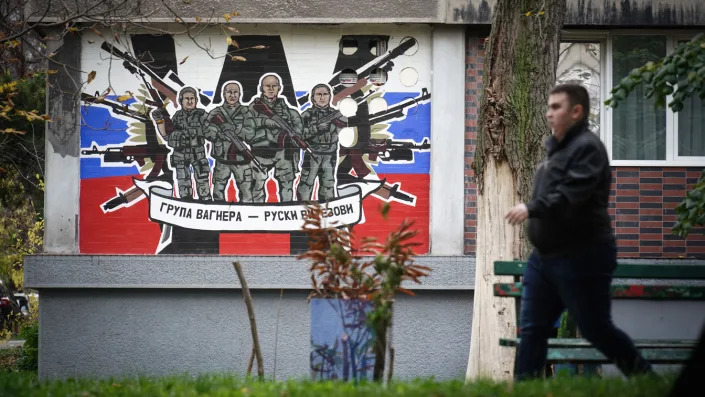
A pedestrian in Belgrade, Serbia, walks past a mural depicting Russia's paramilitary mercenaries, labeled "Wagner Group — Russian knights" on Nov. 17, 2022.
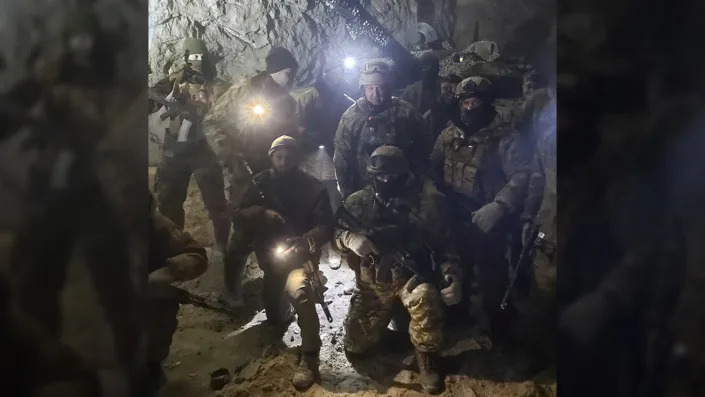
Men in military uniform, purportedly soldiers of the Wagner Group with its head, Yevgeny Prigozhin, center, pose in a salt mine, apparently in Soledar, in the Donetsk region of Ukraine, in this handout picture released Jan. 10. (Press service of "Concord"/Handout via Reuters)
“It’s a brutal fight that he is waging,” Kirby said of Prigozhin, describing the Wagner Group’s offensive as part of an “extravagant effort to increase his influence with the Kremlin.” He also suggested that Prigozhin’s interest in Soledar was not purely strategic, as the town is home to enormous salt and gypsum mines. Such a conflation of interests would not be new: In Sudan, the Wagner Group plundered a gold mine while suppressing democratic dissent.
A native of St. Petersburg like Putin, the 61-year-old Prigozhin is a restaurateur and caterer who started out selling hot dogs. He earned the nickname “Putin’s chef” for the bevy of government catering contracts, including for schools and the military, that eventually came his way.
A pioneer of information warfare, he started the Internet Research Agency, the St. Petersburg troll farm that U.S. intelligence officials believe interfered in the 2016 presidential election.
Prigozhin recently owned up — proudly — to that feat. Though himself a likely billionaire, Prigozhin has little in common with the oligarchs who support Putin but see the Ukraine war as an unseemly distraction from lives of leisure in London or New York. Sarcastic and profane, Prigozhin recalls an earlier, less polished style of political leadership that may appeal to older Russians.
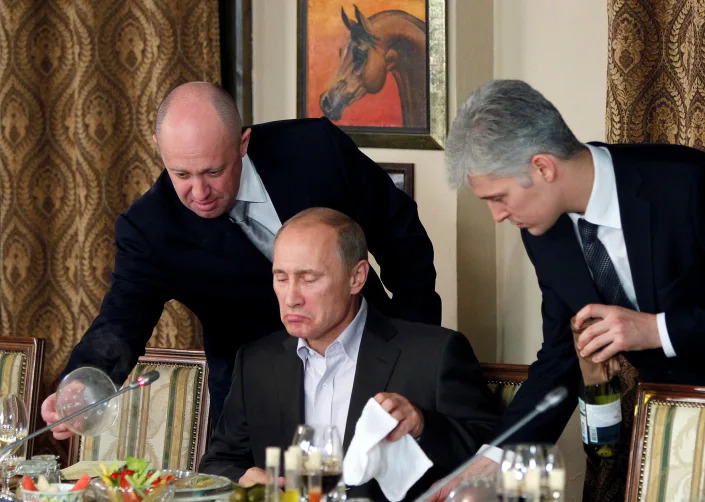
Yevgeny Prigozhin, left, assists Russian Prime Minister Vladimir Putin at a dinner with foreign scholars and journalists at the restaurant Cheval Blanc on the premises of an equestrian complex outside Moscow on Nov. 11, 2011. (Misha Japaridze/Reuters)
Defense Minister Sergei Shoigu has all but disappeared from view, but Prigozhin has eagerly courted public attention. Last November, after a Wagner Group defector was executed with a sledgehammer, Prigozhin adapted the tool as a kind of symbol, even sending one to members of the European Parliament, its handle smeared with fake blood, after an effort there to brand the Wagner Group as a terrorist organization.
Earlier this week, Prigozhin similarly threatened supposed traitors within Russia — including, he suggested, within Putin’s own administration — who he predicted would try to flee to the United States: “They won’t take you in,” he warned. “And then you will come to us, where Wagner’s sledgehammer will already be waiting for you.”
(When asked for an interview last year, representatives for Prigozhin’s Concord Group told Yahoo News that Prigozhin would only accede to the request if Yahoo News sent a reporter to St. Petersburg and also brought colleagues from major American outlets.)
Himself hardened by a nine-year prison sentence handed down in 1981 by Soviet authorities for a range of crimes — these included, according to court documents, theft, robbery and at least one assault — Prigozhin spent much of the fall of 2022 in Russian prisons recruiting inmates for the Wagner Group. He spoke to them in frank, unadorned terms about what they could expect if they agreed to serve in Ukraine.
“If you arrive in Ukraine and decide it's not for you, we will execute you,” he warns in one such recording. Disseminated online, the footage of Prigozhin’s unusual efforts attracted outrage in the West, but also seemed to indicate that he was willing to risk a personal involvement that other Kremlin officials simply would not undertake.
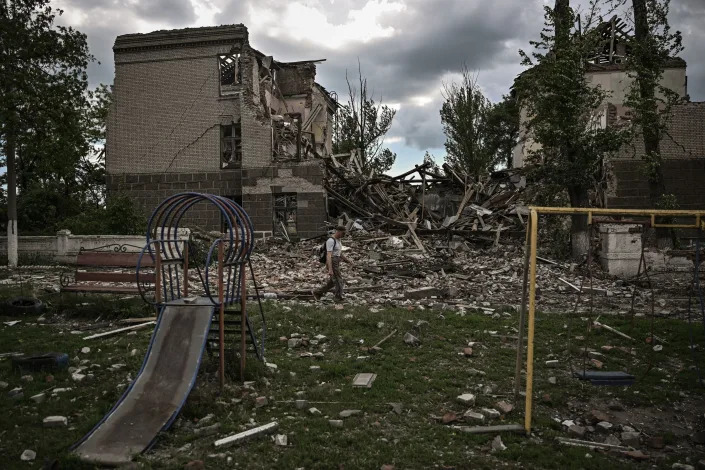
A man walks in front of a destroyed school in the city of Bakhmut, in the eastern Ukranian region of Donbas on May 28, 2022, on the 94th day of Russia's invasion of Ukraine.
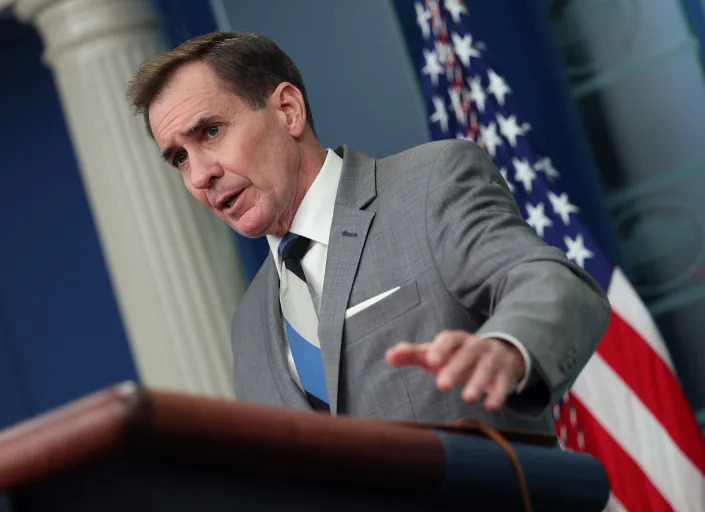
John Kirby, coordinator for strategic communications at the National Security Council, addresses a press briefing at the White House on Jan. 12 in Washington, D.C. (Kevin Dietsch/Getty Images)
“We believe that those tensions remain,” Kirby told Yahoo News, adding that the “rift” between Prigozhin and officials like Shoigu “has not healed.”
With his profile elevated, Prigozhin has become the subject of inevitable political speculation, especially since Putin’s own future — as well as his health — appears more uncertain today than it has been in years.
“Prigozhin, or anyone else for that matter, dare not raise the question of a post-Putin Russia for obvious reasons, but it’s safe to assume that the scenario has crossed his mind,” Rajan Menon, a senior scholar at Defense Priorities, a Washington, D.C., policy center, told Yahoo News.
Prigozhin is hardly the first prominent Russian to see the invasion of Ukraine as an opportunity for advancement. But he may be among the more politically skilled. “He certainly hopes Wagner’s success will boost his standing with Putin, but the risk is that he may stoke Putin’s suspicions if he gets too much political attention in the public space — and that won’t work well for him,” Menon wrote to Yahoo News in an email.
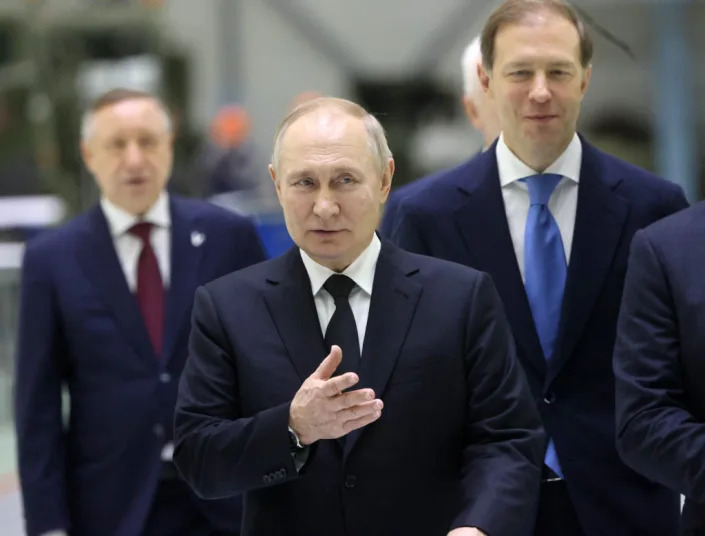
Russian President Vladimir Putin, center, with the governor of St. Petersburg, Alexander Beglov, left, and First Deputy Prime Minister Denis Manturov, right, enter the Obukhov State Plant in St. Petersburg for a meeting with workers on Jan. 18. (Contributor/Getty Images)
Whatever his ambitions, Prigozhin’s influence is sustained by the lives of wayward Russians who form the wave upon wave of fighters whose sheer persistence is meant to exhaust Ukraine’s defenders.
Still, given the infamous brutality of Russian prisons, the mere promise of freedom may be enough to entice more recruits. As long as the Wagner Group continues to muster new forces, Prigozhin's influence with a Kremlin hungry for victories is bound to increase.
One recent clip posted to social media shows Prigozhin addressing former prisoners who had fulfilled their military service and were preparing to head home.
“I told you I needed your criminal talents to kill the enemy in war,” Prigozhin says in the footage, which serves as a kind of recruiting video for the Wagner Group. “Now, criminal talents are no longer needed.”
He then tells the outgoing soldiers who surround him that they should do all they can to avoid returning to prison.
“Try to be a little more careful,” Prigozhin says.
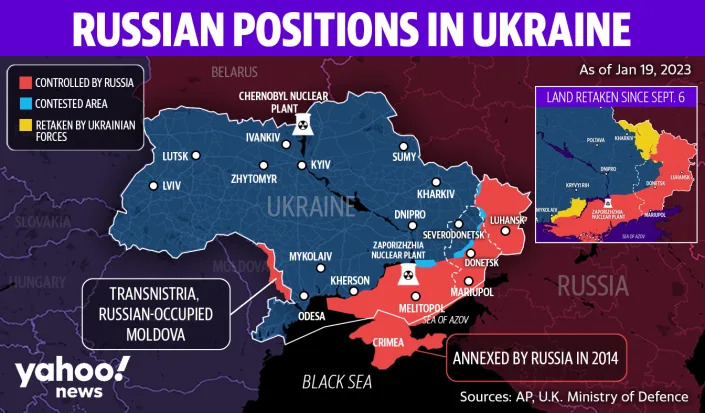
Alexander Nazaryan
·Senior White House Correspondent
Thu, January 19, 2023
A pedestrian in Belgrade, Serbia, walks past a mural depicting Russia's paramilitary mercenaries, labeled "Wagner Group — Russian knights" on Nov. 17, 2022.
(Oliver Bunic/AFP via Getty Images)
A shadowy paramilitary outfit is making gains for Russia in eastern Ukraine — and, in the process, apparently exacerbating tensions back in Moscow, where military chiefs are hesitant to give credit to the influential Kremlin insider responsible for the effort.
The Wagner Group, as the militia is known, is operated by the businessman Yevgeny Prigozhin, a close ally of Russian President Vladimir Putin. Frustrated by months of military setbacks, Putin tacitly allowed Prigozhin last year to recruit soldiers for the Wagner Group from prisons, offering them freedom in exchange for service.
The recent military successes of Wagner fighters have stoked suspicions that Prigozhin is hoping to assert himself politically at a time when few other Kremlin advisers can credibly point to victories of their own.
To be sure, Prigozhin’s successes are modest. But as far as the Kremlin is concerned, at least they are not defeats that have to be explained away with convoluted and unconvincing conspiracy theories by state television propagandists.
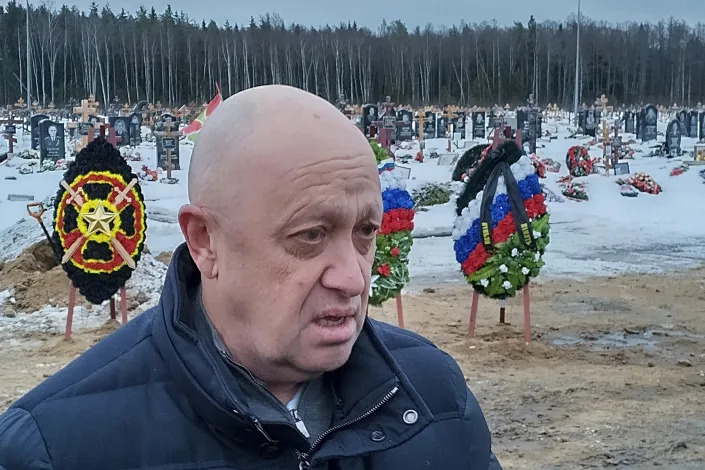
Yevgeny Prigozhin, head of the Wagner Group, attends the funeral on Dec. 24, 2022, at the Beloostrovskoye cemetery outside St. Petersburg, of Dmitry Menshikov, a Wagner Group fighter who died in a special operation in Ukraine. (AP Photo)
In recent days, the Wagner Group appears to have taken the village of Soledar, north of the fiercely contested city of Bakhmut in the Donbas region of Eastern Ukraine.
“Incremental progress” in the Bakhmut area has come “at a great cost,” National Security Council spokesman John Kirby told Yahoo News at a press briefing Wednesday. But considering that Russia had expected to conquer the Ukrainian capital of Kyiv in a matter of days when it first invaded in February last year, any progress at all is significant.
Although the Wagner Group has long operated in Syria and Africa, where it bolsters despotic regimes, its commitment to Ukraine appears to signal an acknowledgment that traditional means of waging war have failed, if largely because Russia’s moribund military has been in desperate need of reform for decades.
Both Prigozhin and the Wagner Group were sanctioned by the U.S. and European governments last spring, with the State Department accusing him of forging “a trail of lies and human rights abuses.”
The Wagner Group is beholden neither to Kremlin bureaucracy nor to history. But by registering as a publicly traded company earlier this week, Prigozhin appears to be seeking official recognition for his army of irregulars.
A shadowy paramilitary outfit is making gains for Russia in eastern Ukraine — and, in the process, apparently exacerbating tensions back in Moscow, where military chiefs are hesitant to give credit to the influential Kremlin insider responsible for the effort.
The Wagner Group, as the militia is known, is operated by the businessman Yevgeny Prigozhin, a close ally of Russian President Vladimir Putin. Frustrated by months of military setbacks, Putin tacitly allowed Prigozhin last year to recruit soldiers for the Wagner Group from prisons, offering them freedom in exchange for service.
The recent military successes of Wagner fighters have stoked suspicions that Prigozhin is hoping to assert himself politically at a time when few other Kremlin advisers can credibly point to victories of their own.
To be sure, Prigozhin’s successes are modest. But as far as the Kremlin is concerned, at least they are not defeats that have to be explained away with convoluted and unconvincing conspiracy theories by state television propagandists.
Yevgeny Prigozhin, head of the Wagner Group, attends the funeral on Dec. 24, 2022, at the Beloostrovskoye cemetery outside St. Petersburg, of Dmitry Menshikov, a Wagner Group fighter who died in a special operation in Ukraine. (AP Photo)
In recent days, the Wagner Group appears to have taken the village of Soledar, north of the fiercely contested city of Bakhmut in the Donbas region of Eastern Ukraine.
“Incremental progress” in the Bakhmut area has come “at a great cost,” National Security Council spokesman John Kirby told Yahoo News at a press briefing Wednesday. But considering that Russia had expected to conquer the Ukrainian capital of Kyiv in a matter of days when it first invaded in February last year, any progress at all is significant.
Although the Wagner Group has long operated in Syria and Africa, where it bolsters despotic regimes, its commitment to Ukraine appears to signal an acknowledgment that traditional means of waging war have failed, if largely because Russia’s moribund military has been in desperate need of reform for decades.
Both Prigozhin and the Wagner Group were sanctioned by the U.S. and European governments last spring, with the State Department accusing him of forging “a trail of lies and human rights abuses.”
The Wagner Group is beholden neither to Kremlin bureaucracy nor to history. But by registering as a publicly traded company earlier this week, Prigozhin appears to be seeking official recognition for his army of irregulars.
Men in military uniform, purportedly soldiers of the Wagner Group with its head, Yevgeny Prigozhin, center, pose in a salt mine, apparently in Soledar, in the Donetsk region of Ukraine, in this handout picture released Jan. 10. (Press service of "Concord"/Handout via Reuters)
“It’s a brutal fight that he is waging,” Kirby said of Prigozhin, describing the Wagner Group’s offensive as part of an “extravagant effort to increase his influence with the Kremlin.” He also suggested that Prigozhin’s interest in Soledar was not purely strategic, as the town is home to enormous salt and gypsum mines. Such a conflation of interests would not be new: In Sudan, the Wagner Group plundered a gold mine while suppressing democratic dissent.
A native of St. Petersburg like Putin, the 61-year-old Prigozhin is a restaurateur and caterer who started out selling hot dogs. He earned the nickname “Putin’s chef” for the bevy of government catering contracts, including for schools and the military, that eventually came his way.
A pioneer of information warfare, he started the Internet Research Agency, the St. Petersburg troll farm that U.S. intelligence officials believe interfered in the 2016 presidential election.
Prigozhin recently owned up — proudly — to that feat. Though himself a likely billionaire, Prigozhin has little in common with the oligarchs who support Putin but see the Ukraine war as an unseemly distraction from lives of leisure in London or New York. Sarcastic and profane, Prigozhin recalls an earlier, less polished style of political leadership that may appeal to older Russians.
Yevgeny Prigozhin, left, assists Russian Prime Minister Vladimir Putin at a dinner with foreign scholars and journalists at the restaurant Cheval Blanc on the premises of an equestrian complex outside Moscow on Nov. 11, 2011. (Misha Japaridze/Reuters)
Defense Minister Sergei Shoigu has all but disappeared from view, but Prigozhin has eagerly courted public attention. Last November, after a Wagner Group defector was executed with a sledgehammer, Prigozhin adapted the tool as a kind of symbol, even sending one to members of the European Parliament, its handle smeared with fake blood, after an effort there to brand the Wagner Group as a terrorist organization.
Earlier this week, Prigozhin similarly threatened supposed traitors within Russia — including, he suggested, within Putin’s own administration — who he predicted would try to flee to the United States: “They won’t take you in,” he warned. “And then you will come to us, where Wagner’s sledgehammer will already be waiting for you.”
(When asked for an interview last year, representatives for Prigozhin’s Concord Group told Yahoo News that Prigozhin would only accede to the request if Yahoo News sent a reporter to St. Petersburg and also brought colleagues from major American outlets.)
Himself hardened by a nine-year prison sentence handed down in 1981 by Soviet authorities for a range of crimes — these included, according to court documents, theft, robbery and at least one assault — Prigozhin spent much of the fall of 2022 in Russian prisons recruiting inmates for the Wagner Group. He spoke to them in frank, unadorned terms about what they could expect if they agreed to serve in Ukraine.
“If you arrive in Ukraine and decide it's not for you, we will execute you,” he warns in one such recording. Disseminated online, the footage of Prigozhin’s unusual efforts attracted outrage in the West, but also seemed to indicate that he was willing to risk a personal involvement that other Kremlin officials simply would not undertake.
A man walks in front of a destroyed school in the city of Bakhmut, in the eastern Ukranian region of Donbas on May 28, 2022, on the 94th day of Russia's invasion of Ukraine.
(Aris Messinis/AFP via Getty Images)
In Foreign Policy magazine, two Eurasia experts, Peter Rough and Can Kasapoglu, predicted that Prigozhin was making a “power play” intended specifically to challenge Shoigu’s leadership of the military,
Prigozhin ultimately managed to recruit an estimated 40,000 prisoners into the Wagner Group. They were deployed late last year in the Bakhmut region, where Russia has been concentrating its attacks. A senior Pentagon official acknowledged in mid-December that the fighting around Bakhmut had become “very tough,” in part thanks to the ragtag Wagner forces.
The capture of Soledar appears to be the fruit of Prigozhin’s efforts, but that effort is predicated on a disregard for human life that most Western military leaders would simply not countenance. “They continue to throw body after body into this effort,” Kirby said of the Russian advances around Soledar, which he assessed as having been “largely driven” by the Wagner Group.
Last week, credit for Soledar became a point of contention between Prigozhin and the Kremlin, which tried to downplay the Wagner Group’s role, claiming that regular forces were responsible for taking the town. The ensuing disagreement between Prigozhin and the Kremlin played out publicly, in contrast to most Kremlin disputes, which are customarily conducted behind the citadel’s soaring red walls.
In Foreign Policy magazine, two Eurasia experts, Peter Rough and Can Kasapoglu, predicted that Prigozhin was making a “power play” intended specifically to challenge Shoigu’s leadership of the military,
Prigozhin ultimately managed to recruit an estimated 40,000 prisoners into the Wagner Group. They were deployed late last year in the Bakhmut region, where Russia has been concentrating its attacks. A senior Pentagon official acknowledged in mid-December that the fighting around Bakhmut had become “very tough,” in part thanks to the ragtag Wagner forces.
The capture of Soledar appears to be the fruit of Prigozhin’s efforts, but that effort is predicated on a disregard for human life that most Western military leaders would simply not countenance. “They continue to throw body after body into this effort,” Kirby said of the Russian advances around Soledar, which he assessed as having been “largely driven” by the Wagner Group.
Last week, credit for Soledar became a point of contention between Prigozhin and the Kremlin, which tried to downplay the Wagner Group’s role, claiming that regular forces were responsible for taking the town. The ensuing disagreement between Prigozhin and the Kremlin played out publicly, in contrast to most Kremlin disputes, which are customarily conducted behind the citadel’s soaring red walls.
John Kirby, coordinator for strategic communications at the National Security Council, addresses a press briefing at the White House on Jan. 12 in Washington, D.C. (Kevin Dietsch/Getty Images)
“We believe that those tensions remain,” Kirby told Yahoo News, adding that the “rift” between Prigozhin and officials like Shoigu “has not healed.”
With his profile elevated, Prigozhin has become the subject of inevitable political speculation, especially since Putin’s own future — as well as his health — appears more uncertain today than it has been in years.
“Prigozhin, or anyone else for that matter, dare not raise the question of a post-Putin Russia for obvious reasons, but it’s safe to assume that the scenario has crossed his mind,” Rajan Menon, a senior scholar at Defense Priorities, a Washington, D.C., policy center, told Yahoo News.
Prigozhin is hardly the first prominent Russian to see the invasion of Ukraine as an opportunity for advancement. But he may be among the more politically skilled. “He certainly hopes Wagner’s success will boost his standing with Putin, but the risk is that he may stoke Putin’s suspicions if he gets too much political attention in the public space — and that won’t work well for him,” Menon wrote to Yahoo News in an email.
Russian President Vladimir Putin, center, with the governor of St. Petersburg, Alexander Beglov, left, and First Deputy Prime Minister Denis Manturov, right, enter the Obukhov State Plant in St. Petersburg for a meeting with workers on Jan. 18. (Contributor/Getty Images)
Whatever his ambitions, Prigozhin’s influence is sustained by the lives of wayward Russians who form the wave upon wave of fighters whose sheer persistence is meant to exhaust Ukraine’s defenders.
Still, given the infamous brutality of Russian prisons, the mere promise of freedom may be enough to entice more recruits. As long as the Wagner Group continues to muster new forces, Prigozhin's influence with a Kremlin hungry for victories is bound to increase.
One recent clip posted to social media shows Prigozhin addressing former prisoners who had fulfilled their military service and were preparing to head home.
“I told you I needed your criminal talents to kill the enemy in war,” Prigozhin says in the footage, which serves as a kind of recruiting video for the Wagner Group. “Now, criminal talents are no longer needed.”
He then tells the outgoing soldiers who surround him that they should do all they can to avoid returning to prison.
“Try to be a little more careful,” Prigozhin says.


No comments:
Post a Comment